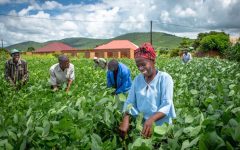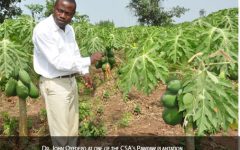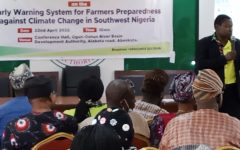TETFund Train Over 1400 South-West Farmers On Climate Change
November 3, 2023 2023-11-08 13:57TETFund Train Over 1400 South-West Farmers On Climate Change
To ensure food security in Nigeria and ease access to early warning systems and information, over 1,440 farmers from 70 villages across six South-West states have been trained on smart farming practices.
The initiative, sponsored by the Tertiary Education Trust Fund (TETFund) in Abeokuta, was organized to give selected farmers access to early warning systems and information dissemination platforms.
Speaking at the event, a researcher from the Federal University of Agriculture, Abeokuta, Dr John Oyedepo, said the goal of the training was to assist the country in achieving food security and improving the economic status of farmers.
Oyedepo, who doubles as the Deputy Director, Food Security Environmental Resources and Agricultural Research (FUNAAB), said the institution had commenced sensitization of the farmers on climate information services for early warning system on climate change.
He said, “The project trained 1,440 farmers from 70 villages across the six states on smart farming with access to early warning system and information dissemination platforms. The farmers, through the research outcome, also have access to weather information websites, online radio and other small phone-enabled applications aimed at providing useful information on farming activities.”
“The other thing we also did is to give them other interventions, like irrigation, so that in case we have a prolonged drought, they will be able to go to farms and still produce something.”
On stemming food insecurity in the Nigeria, the researcher said the plan was to train 65,000 farmers across the South-West region.
“When we have about 65,000 farmers operating one hectare of a farm successfully, you can imagine what quantity of food will be injected into the country.”
“Incidentally, our food balance sheet is not clear, and Nigeria is growing with a population of over 200 million, yet we are not able to feed ourselves. We are still importing, so by now if we have things like irrigation, it is a full package, and you will see that more food will be produced,” he added.






